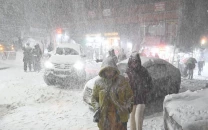Our faltering counterterrorism strategy
Federal and provincial governments ought to adopt a consistent policy to counter extremism & terrorism in the country

The writer is an independent political and defence analyst. He is also the author of several books, monographs and articles on Pakistan and South Asian affairs
The North Waziristan operation gained the acceptance of a large section of Pakistan’s civilian population. A number of political parties and societal groups came out openly in support of tough action against all kinds of religious, sectarian and terrorists groups. The hitherto pro-Taliban elements made cautious criticisms by talking about the possible impact of the security operation on cities, displacement of people from the tribal areas and by asserting that all Taliban were not anti-Pakistan.
The security operation restored the confidence of the global community in the capacity of the Pakistan military to deal effectively with terrorism. This was the main reason that the army chief received extraordinary attention during his visits to the US, the UK and China. This also contributed to changing the security-related interaction between Pakistan’s security establishment and the new Afghan government led by President Ashraf Ghani. These two countries are now involved in a more active cooperative interaction for dealing with security matters, especially counterterrorism.
The other incident that built support for taking firm action against the Taliban and other such groups was the terrorist attack on the Army Public School in Peshawar on December 16, 2014. The initiative for creating a shared framework of action against terrorism came, once again, from the army top brass. It was their influence against the backdrop of the nationwide shock of the Peshawar attack that the civilian government and other leaders, including pro-Taliban religious parties and Imran Khan’s Pakistan Tehreek-e-Insaf, agreed on a 20-point National Action Plan in the first week of January 2015. The military is now determined to root out the terrorist threat based primarily in the tribal areas and strengthen security on the Pakistan-Afghanistan border. It is also engaged in capacity-building of civilian law-enforcement agencies for dealing with sectarian and violent groups based in cities.
The civilian federal and provincial governments vowed repeatedly to implement the 20-point National Action Plan. Some actions were taken by these governments in the immediate aftermath of the plan’s adoption. However, with the passage of time, the civilian enthusiasm for countering terrorism began to decline. The old fault lines based on ethnic, regional and religious-sectarian have resurfaced and the supporters of militancy are again becoming active. All this makes it difficult for the ruling PML-N to adopt a forthright approach on implementing the 20-point agenda. Its electoral support overlaps with Islamic conservatives and militant groups.
The army, in cooperation with the air force and paramilitary forces, is using its coercive power to crush the Pakistani Taliban and their affiliates. However, the army cannot launch a similar security operation in urban areas. It is here that the role of civilian circles, especially the government, becomes critical to controlling extremism and terrorism.
The military courts have so far not started working; the federal government has not committed any case to them. As a section of lawyers have filed petitions in the Supreme Court for nullifying the 21st Amendment and some religious parties have taken exception to the focus of military trials on religion-linked terrorism, the federal government has adopted a go-slow policy on military courts.
The federal government has mentioned different figures, ranging from 60 to 78, of banned organisations. However, no complete list has been released as the federal government has not stated publicly which organisations have been banned. Its policy of financial and academic monitoring of religious seminaries has also run aground because most madrassa organisations have declared that they would contest the government on madrassa-related affairs. Madrassa organisations identifying with certain religious traditions are more vocal about, and more determined to, fight the federal government on the proposed madrassa reforms.
The Punjab government has arrested a number of religious leaders on account of misuse of loudspeaker rules and for making objectionable speeches. It has also banned the sale of religion-oriented books that are said to promote negative attitudes or hatred against different sects. A number of people have been taken into custody for anti-social activities or for their linkages with sectarian and violent organisations. Most of these arrests have been done on the basis of the lists of such people maintained by police stations. Some activists of religious groups are taking exception to the arrests of religious leaders for misuse of loudspeakers and the restrictions on the sale of religious literature with strong sectarian bias. Some columns in Urdu language newspapers have criticised the banning of religious-sectarian books by well-known authors.
The federal and provincial governments will have to adopt a consistent and high-speed policy to counter religious extremism and terrorism. If they do not adopt such a policy, the extremist and terrorists, jolted by the Pakistan Army’s security operation in the tribal areas, will retrieve their lost position. The civilian governments must show unity of mind in controlling extremism, sectarianism and terrorism in urban areas. They need to rise above partisan considerations and the fear of losing electoral support of Punjab-based militant groups. If this does not happen, extremism, sectarianism and terrorism will continue to haunt Pakistan even after the army establishes full control in the tribal areas.
Published in The Express Tribune, February 9th, 2015.
Like Opinion & Editorial on Facebook, follow @ETOpEd on Twitter to receive all updates on all our daily pieces.














COMMENTS
Comments are moderated and generally will be posted if they are on-topic and not abusive.
For more information, please see our Comments FAQ